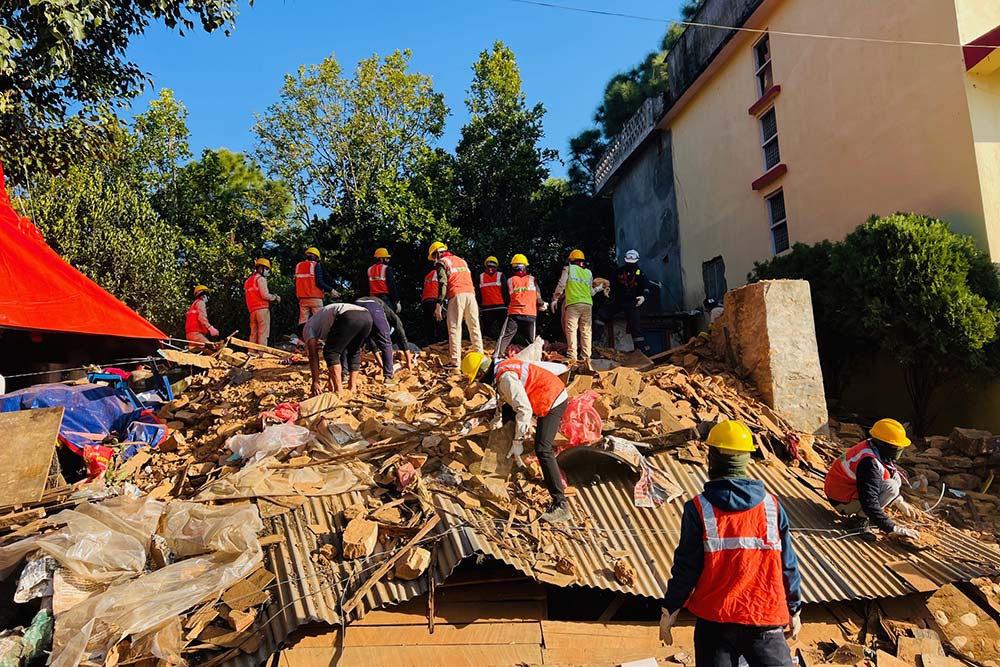
In recent months, victims of cooperatives from different regions of the country have been protesting in the capital seeking their savings and investment back as many cooperatives have shut shop with owners and management absconding. The number scams in the cooperatives sector is seen to be increasing as economic slowdown hits the country.
The Central Bureau of Investigation (CIB) of Nepal Police had arrested Kedarnath Sharma, former Chairperson of Shiva Shikhar Multipurpose Co-operative, Bhaktapur from Mumbai, India, for his alleged involvement in embezzling Rs 14 billion from deposits of members. Sharma has apparently siphoned off the funds from Nepal to set up businesses in India and Myanmar, according to CIB.
During the investigation, it has come to light that some of the promoters alleged in swindling public deposits are found running other cooperatives as well. For instance, Sharma was also running Tulasi Cooperatives in Morang. The local level administration, the police and Department of Cooperatives have been flooded with grievances related to the cooperative sector fraud.
Renowned real-estate trader and developer, Ichha Raj Tamang, who used to lead Civil Cooperative, is currently facing a court case on money laundering through a scam perpetrated through his cooperative. Just a year ago, the Department of Money Laundering Investigation filed a case at the Special Court against him seeking Rs 3.31 billion as principal.
Glaring examples of political protection and money laundering have been witnessed during the investigation of cooperatives fraud. The Department of Cooperatives based on the grievances of 1,175 members, has recently corresponded with the Ministry of Land Management, Cooperatives and Poverty Alleviation to announce Gautamshree Cooperatives as problematic. However, reportedly, its promoter, Ram Bahadur Gautam has political protection which leaves the victims deprived from getting their deposits back.
The Ministry has also identified and announced two other cooperatives in the red - Oriental Cooperatives and Pashupati Saving and Credit Cooperatives.
There are various categories of cooperatives based on their nature of work — multipurpose and saving and credit cooperatives. Cooperatives in the country have mobilised more than Rs 400 billion of public money, according to Khimananda Acharya, Deputy Registrar at the Department of Cooperatives. “We must admit that cooperatives are beyond prudent regulations,” he stated, adding, “As a result, there are a large number of such cases, mainly in the urban areas and a majority of the fraud cases are related to the savings and credit cooperatives.”
There are around 31,373 cooperatives in the country with 7.4 million members, however, due to lack of proper regulation and supervision, cooperatives are facing operational and market risks and promoters of some of the large cooperatives have been found to be involved in fund embezzlement and fraudulent activities.
Out of the total 31,373 cooperatives operational across the country, around 14,000 are savings and credit cooperatives. Cooperatives are often alleged to be a tool for promoting informal economy, and sometimes even a resort to park illegal money.
Considering the pressing challenges, the Department of Cooperatives has enforced a directive on cooperatives with annual transaction of Rs 100 million whereby they must abide by the Directives for Money Laundering Prevention in Cooperatives, according to Acharya.
As mandated by the Cooperatives Act 2017, the Department of Cooperatives supervises cooperatives having annual transactions of above Rs 250 million. Cooperatives are being regulated as per their jurisdiction:
- one local level cooperative is regulated by concerned municipality/rural municipality
- cooperatives in two or more municipalities in the same province are regulated by the provincial government
- one provincial cooperative having annual transaction of Rs 250 million is regulated by Department of Cooperatives
- cooperative with transaction over Rs 500 million is regulated by Nepal Rastra Bank.
The central bank, however, is reluctant to regulate and supervise cooperatives citing capacity constraints and is confined to regulating and monitoring banks and financial institutions licensed by the bank.
The main motive of cooperatives is to work at the community level to empower its members financially. Government and development partners collaborate with cooperatives to execute their programmes related to enterprise development, insurance, health services, awareness and production. The member-based organisations in each community are expected to be self-regulated by their members, which has seldom happened, according to the advocates of the cooperative movement. Taking this into consideration, the Cooperatives Act has a flexible provision to establish cooperatives with member base of merely 25 individuals.
Chitra Kumari Thamsuhang Subba, General Manager of National Cooperative Federation of Nepal, admitted that the cooperative movement has derailed from its original purpose, shifting now to profit mongering. “The Constitution of Nepal has recognised the cooperatives sector as one of the important pillars of the economy. It can be a vital too to promote entrepreneurship and inclusiveness for economic stability,” she said.
Ram Laxman Raya, Managing Director of Rajshree Saving and Credit Cooperatives, which has been providing services in eight districts of the Terai said, “People with strong political nexus have been using the cooperatives sector to loot people’s hard-earned money. They attract the common people by offering high interest rates on savings and flee after swindling a sizable amount of money. Such practice and lack of prudent regulation, supervision and rule of law have created hardships for genuine institutions to survive.
Text: Pushpa Raj Acharya







